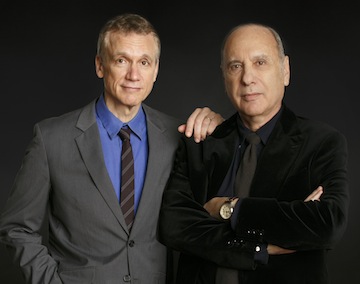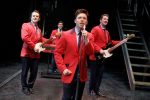The Four Seasons of Jersey Boys sings “Sherry.” (photo from Broadway Across Canada)
The multiple-award-winning Jersey Boys comes to Queen Elizabeth Theatre Nov. 14-19. The musical about Frankie Valli and the Four Seasons was written by Jewish community members Marshall Brickman and Rick Elice.
Elice spoke to the Jewish Independent by phone from New York. He and Brickman were friends well before they became writing partners on the musical and other projects.
“We became friends somewhere in the ’90s, 1997-’98, around there, and Jersey Boys didn’t present itself as an opportunity until 2002, although we didn’t really do anything about it until the very end of 2003,” said Elice, noting that the day prior to our interview, Oct. 17, marked the 13th anniversary of the very first production of Jersey Boys, which opened at the La Jolla Playhouse in 2004.
When Elice was asked to write the musical, he asked Brickman to collaborate with him.
“I had spent a couple of decades in advertising and I was no longer doing that,” he explained. “I was working at a movie studio in California and a former client called – this was right after Mamma Mia! had opened on Broadway – and he said, ‘Hey, I have the rights to the Four Seasons’ music.’”
Initially, Elice thought he meant Vivaldi’s “Four Seasons.” After setting him straight, the former client asked, “‘Well, would you be interested in doing the Mamma Mia! [concept] with the music of the Four Seasons?’ And I said, ‘No, somebody already did that, somebody already did Mamma Mia!’”
But Elice agreed to have lunch with Valli and Bob Gaudio, principal songwriter of the Four Seasons, and he called Brickman.
He and his friend “had been flirting with the idea of maybe writing something together,” said Elice, “which we assumed would be a screenplay because I was working at a studio and Marshall is, of course, an Oscar-winning screenwriter of some renown; I mean, he’s a legend. And I said, ‘Suppose we were to write a Broadway musical?’ And he said, ‘I’ve never written a Broadway musical.’ ‘Well, neither have I! But no one’s going to pay us anything, so we’ll just be wasting our own time and maybe we’ll have some fun. Let’s go to lunch and see what these guys are like.’”
During lunch, they asked Valli and Gaudio what it was like growing up in New Jersey, said Elice. “They started to tell us these jokes and anecdotes that were so, by turn, hilarious, tragic, stunning, but all of them engaging and compelling. We found ourselves leaning forward like anyone would when being told a really good story. And we said, ‘Hey guys, if you wanted to do this, if you wanted to do your warts-and-all life story, life of the group, that would be something that would be interesting because, look at us, we’re on the end of our seats. Other people would probably respond similarly, too.’… And they said, ‘OK, go ahead, knock yourself out. If we like what you do, then we’ll give you the gig.’”
Valli and Gaudio liked the first few scenes that Elice and Brickman wrote, so the writers began shopping the musical around. “The stars were in alignment,” said Elice, “as we wrote in the show.” The perfect producers, a director and venue were all lined up. “The only thing we didn’t have was the show,” he said. But, within a couple of months, he and Brickman had completed a script and, by August 2004, the production was in rehearsal in Southern California.
“And audiences loved the show from the very first performance,” said Elice. “We were always there in the back with our pads, ready to edit and make changes and do all the things in previews you’re supposed to do, but the show was really solid. Fundamentally, the show didn’t change. We improved certain things about it but there was no big surgery to be done on anything.”
He attributed the success to the music, which “underpins all our lives,” and to the fact that the group’s story is “a compelling one.”
“That’s always the secret to good theatre,” he said. “Tell a good story with characters the audience cares about.”
He also credited director Des McAnuff with being “a great visionary and a great field marshal for the project. He created this rocket ship that we all got on. It was a super-happy experience that could have amounted to nothing, and it ended up changing all of our lives.”

Part of the happy experience was writing with his friend.
“Writing for the theatre is like talking something into existence,” said Elice. It’s much harder to talk something into existence when you’re talking mainly to yourself, working as the sole writer, he said. “What I love about working with Marshall is that he taught me that, before you do anything, you take very long walks together and talk and talk and talk and talk, until you know how the characters sound, you know how to voice them, you know what happens, you’ve argued about plot and story and then, at some point, you have nothing left to do but sit down and actually write it. But the writing itself, the act of writing, is a product of extensive thinking and arguing and talking.”
There were no rules or a specific format for how the collaboration worked, said Elice. “If he wanted to write a scene, he would; if I wanted to, I would; then we would swap. And then, eventually, we were together combing through it.”
Elice said that he and Brickman weren’t involved in the making of the film version of Jersey Boys, which was directed by Clint Eastwood. “Generally, what the theatre offers that the film doesn’t offer is the live event,” said Elice.
He explained, “The existence of theatre ought to have ended by now – there are many, many other things to do. The theatre is expensive, it only happens in certain places at certain times of the day, it’s not convenient, it’s not particularly user-friendly as a medium, and yet it still exists. It’s actually doing better now than it did last year and, the year before that, it did better than the year before that, etc. So, why is that the case? Because, I think, we’re hardwired as a species – you and I and everyone around us – back to the days when cave-dwellers sat around fires and told each other stories. We like the idea of sitting in the dark and being told stories and experiencing them with other people sitting in the dark at the same time, experiencing the same story that will never be told in exactly the same way because it’s never the same. While the material may be the same, the performing of it is different, the audience is different, the chemistry in the room is different – everything changes.
“Each performance of a live event is a unique performance … and somewhere in there, somewhere in that unique experience, is something that’s thrilling for us,” he continued. “And what Des does specifically with Jersey Boys is to create a variety of roles for the audience because you’re not just sitting watching a show – you’re also the audience in the saloon, you’re the audience in the recording studio, you’re the audience at the concert, you’re the audience at the stadium. And there’s alchemy that happens with Jersey Boys on stage, where the audience, I think, really forgets that they’re watching actors playing these four guys and begins to believe that they are the Four Seasons and we are the people watching them. And so, the audience responds like they would at a rock concert, and not like they would do politely at a Broadway musical.”
He added, “It also happens to be a feel-good show and, as the world winds its way, a feel-good experience doesn’t feel out of sorts, because the rest of our days, we’re constantly facing greater challenges individually and collectively…. There are problems, there are bad things, so, you go to the theatre and feel good, it feels like a nice gift to give people.”
On Oct. 17, Jersey Boys’ 13th anniversary, a new company started rehearsals for another run of the show, said Elice. He dropped in to say hello to everyone and let them know of the significance of the day. “It’s a little like teaching,” he said. “If you’re a teacher, every year, the students stay the same age and you keep getting older … and I feel a little bit that way about Jersey Boys companies. I show up on the first day of rehearsals and, at the first production [in 2004], I was the same age as everybody in the show, and now I’m this old guy, because so many years have gone by but, of course, we’re still telling the story of a boy band, so you’ve got a cast in their 20s, and that’s a misty distant memory for me now.”
For tickets to Jersey Boys in Vancouver, visit ticketmaster.ca or call 1-855-985-5000.

